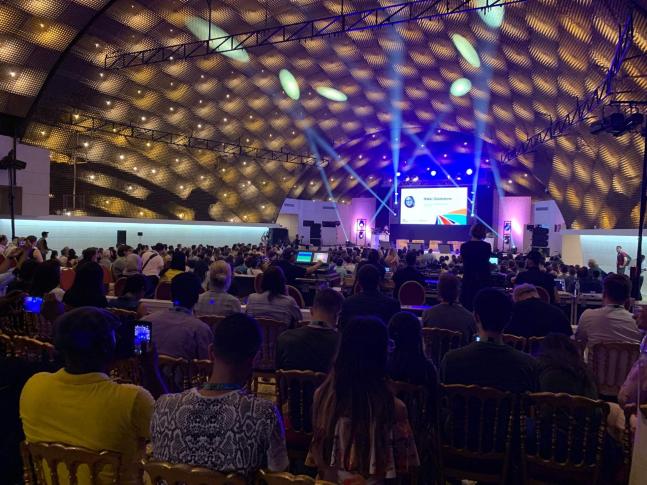
In the realm of internet freedom and digital rights, there are two big global events: the Internet Freedom Festival (IFF) and RightsCon. This year, I had the honour of becoming one of the IFF fellows (my first time attending the IFF!) and attending my third RightsCon, as part of my organisation Open Culture Foundation, with the support of APC’s Member Exchange and Travel Fund. I often hear people compare these two events, so I thought I would take this chance of sharing my experience to benefit newcomers to the field. I will skip introducing these events, as you can find good information on the internet already.
The festival
The IFF stresses that “it’s not a conference, it’s a festival”. IFF organisers put a lot of emphasis on building personal relationships. From glitter tables to expo tables, there’s even a Developer Meet-up, which is like “speed dating” with other developers. I liked it a lot and met awesome people there.
The IFF worked hard to bring voices from all regions, and that is also part of the IFF Fellows’ mission. I was happy to see a healthy amount of people coming from East Asia and Southeast Asia, and presenting as well.
The conference
I have attended the annual RightsCon since 2017. At that time, both myself and my organisation, Open Culture Foundation, were new to the area of digital rights. We learned a lot there, from quantum cryptography to artificial intelligence (AI) presented in understandable ways. We also got to know a lot of people.
At RightsCon, there tend to be more researchers (this year the proportion seemed to reach an all-time high). They hosted many sessions, most of them cutting-edge, vigorous and informative, which I learned a lot from. Another type of session that is common at RightsCon but not at IFF is the gathering with policy makers and corporate leaders.
Here’s a closer look into the sessions I participated in (very future-looking!).
Rights and Ethics: When technology knows how you feel
In this session, participants looked at emotion-detecting technologies and technologies that “respond” to human emotion. The moderator prepared several scenarios for participants to discuss the various social and ethical issues this may cause. You can find the scenarios and discussion outcomes here.
Refraction Networking: Deploying next-generation censorship circumvention
Traditionally, almost all censorship circumvention schemes require sending traffic originally destined for a blocked website to a non-censored “proxy”; the proxy will then forward the traffic to its original destination. There are inherent pitfalls with this approach (see the refraction networking coalition website). That’s how a new approach to censorship circumvention was developed: a series of technologies, called refraction networking (RN). Basically, instead of setting up traditional “proxy” services, RN is deployed in the network of an internet service provider (ISP), as a combination of special middleboxes, traffic processors and router configurations. The ISP helps clients masquerade traffic going to censored destinations as destined for websites hosted in that ISP.
The biggest difference between RN and traditional “proxy” protocols is that RN can only be deployed at the ISP level. RN also exploits fundamental behaviour of internet protocols (TCP), making it much harder to detect.
Currently, the team is working with Psiphon (a censorship circumvention company) to build RN into the Psiphon client. On the server side, the RN team works with a few university ISPs in the US and is looking to expand. Also, currently RN still has higher latency and lower bandwidth compared to traditional circumvention approaches, so the Psiphon client will only enable RN when it sees that other approaches are blocked/slow.
After attending the IFF and RightsCon in a short time period, I can say that IFF is where you can interact with and get to know a lot of interesting people, while RightsCon is where you can learn high-level stuff, cutting-edge concepts and trends.
Image: RightsCon 2019, by Pellaeon Lin.